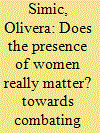| Srl | Item |
| 1 |
ID:
095234


|
|
|
|
|
| Publication |
2010.
|
| Summary/Abstract |
Women are being encouraged to join peacekeeping operations as sexual violence problem-solving forces while simultaneously undertaking a complex role as 'protectors' of local women from local men and male peacekeepers. Since the adoption of Security Council resolution 1325 in 2000, the UN has urged states to deploy more women. Among the implicit assumptions underlying these calls are that an increase in the representation of women in peacekeeping operations (PKOs) will lead to a decrease in the cases of HIV/AIDS, a decline in the number of brothels around peacekeeping bases, and a reduction in the number of babies fathered and abandoned by peacekeepers after their mission comes to an end. Evidence suggests that the presence of women peacekeepers can and does foster a change in male behaviour when women are deployed in PKOs. This article argues, however, that countering abuse should not be a substitute for the more encompassing goal of improving gender balance and equality in PKOs. While there is a need to combat sexual violence in PKOs, the responsibility for prevention should be on troop-contributing countries, which need to exercise accountability and prosecute sexual violence committed by their peacekeepers. Diverting responsibility to women does not address the problem of sexual violence in PKOs, or help eradicate its causes.
|
|
|
|
|
|
|
|
|
|
|
|
|
|
|
|
| 2 |
ID:
133939


|
|
|
|
|
| Publication |
2014.
|
| Summary/Abstract |
In March 2008 the United Nations General assembly adopted Resolution 62/214, which promulgated the 'Comprehensive Strategy on Assistance and Support to Victims of Sexual Exploitation and Abuse by United Nations Staff and Related Personnel'. Although reports on widespread sexual exploitation and sexual abuse emerged in the early 1990s, until 2008 there was no strategy specifically developed to assist women sexually exploited or abused by, and children fathered by, UN peacekeepers. In this sense, the Comprehensive Strategy is groundbreaking. However, we argue that UN policy fails to distinguish adequately between sexually exploitative and consensual relationships, which can create confusion for personnel as to what sexual conduct is permitted and what is prohibited. This paper will provide a critical analysis of the Comprehensive Strategy, examining its potential and obstacles to its implementation, with specific regard to children born to peacekeeping personnel engaged in consensual relationships with local women. This examination will be conducted within the context of the case study of Marko Šušnja, born to a Bosnian peacekeeper father and East Timorese mother.
|
|
|
|
|
|
|
|
|
|
|
|
|
|
|
|